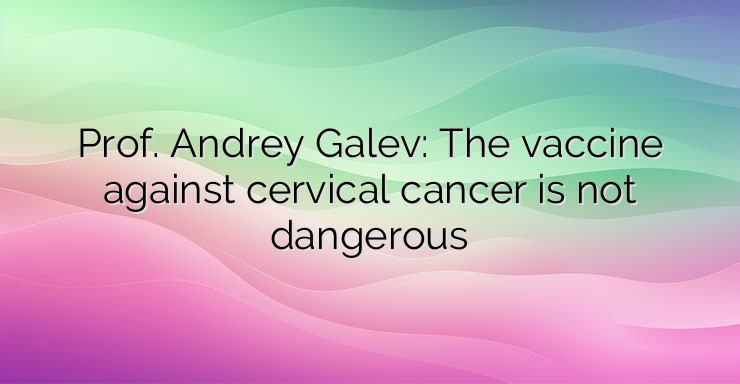Colonel Assoc. Dr. Andrey Galev graduated in medicine in Sofia in 1986. He has specialties in dermatology and venereology, infectious diseases, tropical medicine. Since 2003, he has been the head of the Scientific and Applied Center for Military Epidemiology and Hygiene at the Military Medical Academy. There are over 200 publications in the scientific press and participation in international forums. He is the chairman of the Bulgarian Association for Preventive Medicine. He is a member of the Scientific Society of Dermatology and Venereology and the Scientific Society of Infectious Diseases. What do the current statistics show about the incidence of cervical cancer in our country? Unfortunately, in the last few years the statistics for Bulgaria have not changed in a positive direction. Cervical cancer cases in our country are increasing by about 1.2% per year. Nearly 400 are fatal per year. This means that in Bulgaria every day one woman dies from cervical cancer, even a little more. The latest statistics are from 2010, they are prepared based on information from personal outpatient cards. Because it takes time to collect and process the data, the statistics actually come out two years late. I strongly hope that in the future there will be an improvement, that we will report a lower frequency, that there will be the least amount of stationing. Is part of the problem hidden in the lack of prevention? For the moment, as care for the health of Bulgarian women, one can rely mostly on primary prevention and the national program of the Ministry of Health, which includes vaccination of 12-year-old girls against cervical cancer under a reimbursement model. And why exactly 12-year-old girls? Age is not chosen by chance. 12-13 years is indicated in European countries as the age for starting the first sexual contacts for girls. Since the best results of vaccination are obtained when girls have not started sexual life, it can be said that it is almost 100% protection against cervical cancer. In no case should it be considered that older girls should not be vaccinated, even if they have started sexual life. In most countries, there are so-called catch up models that “catch up” this vaccination scheme to a different age – up to 18, 21 or 23 years. In Australia, it is the highest reimbursement model for sexually mature women – up to 44 years. Our country already takes over the vaccination of girls at the age of 12. Unfortunately, the girls of 13, 14 years old, who often have not even started a sexual life, remain “overboard”. On the face of it, it’s unfair, but you still have to start somewhere. There are certain anti-vaccination currents in our country. Why is the Bulgarian skeptical of vaccines? The Bulgarian is skeptical not only of vaccines. Usually, when he is offered something for free, he thinks it must not be worth it. On the other hand, one wonders who else could benefit from this. NEWS_MORE_BOX The Bulgarian is skeptical because sometimes he receives information that is incorrect and not researched. But, he hears something and starts repeating it. I will give an illustrative example.I came across an interesting headline on the internet saying that a 13-year-old girl in the US died two days after being vaccinated against cervical cancer. At the bottom of the text, however, it says that two days after the immunization, the girl died in a car accident. But many people do not read the text down and do not pay attention to the details. However, this can provoke the making of an incorrect decision. Therefore, it is wise to trust the experts. What are the most common vaccine myths and what are the facts? According to some claims, immunization exhausts the immune system… Very often they say about vaccines in general that their administration overloads the immune system. This is not true. Theoretically, the immune system can respond to the administration of 10,000 vaccines. In practice, this means that with the placement of 11 vaccines, as many as are in the immunization calendar, one thousandth of the capacity of the immune system is loaded. A growing young child also collects many other non-vaccine antigens and this happens daily. In any case, the immune system must form antibodies against various pathogens and diseases. This can happen when a person gets sick or when the cause of the disease is administered to them in a form that cannot cause the disease. In this regard, I think that the easier and correct way is to avoid the disease.


Leave a Reply